Accelerating India’s rise as a global powerhouse of autonomous intelligence

With the rise of agentic AI, AI is evolving beyond traditional automation and moving towards attaining a higher level of autonomy. Rajnil Mallik and Dr. Indranil Mitra examine how India is uniquely positioned to lead the autonomous intelligence sector.
The rise of agentic AI
From machine learning (ML) to deep learning, to generative AI (GenAI) and now agentic AI – artificial intelligence has evolved rapidly in recent years. Today, agentic AI is able to reshape intelligent systems with its human-like ability to act, reason and collaborate. It is beginning to transform enterprises by reshaping workflows, driving accelerated innovation and enabling hyper-personalisation at scale. Multiple AI agents can autonomously collaborate and execute entire processes – at times across diverse ecosystems – with minimal human prompting. Agentic AI is truly reshaping enterprise software and software as a service (SaaS) business models1. While organisations would earlier make software purchase decisions based on the number of users, they are now evaluating solutions based on the number of workflows that can be autonomously orchestrated and optimised.

This paradigm shift is already capturing the attention of business leaders across industries as demand surges for AI models that are capable of advanced reasoning and human-like interaction – hallmarks of agentic AI.
A recent breakthrough exemplifies this shift: a newly released generative pre-trained transformer (GPT) model demonstrates sophisticated reasoning and intuitive, human-like responses. Described as being a step closer to artificial general intelligence (AGI), where AI mirrors human cognitive abilities, this model acts – amongst other things – as a powerful coding assistant that can build websites or apps from simple prompts.
The momentum doesn’t stop there. Reflecting the growing integration of AI into everyday life, a leading telecom operator in India has taken a bold step, offering select users a free one-year subscription to a premium AI service. While it is common to bundle OTT services with mobile plans, this is perhaps the first time an AI assistant has been included in such offerings. It’s a clear signal that both the accessibility and quality of AI systems are rapidly advancing.
Moves like this are disruptive. By embedding AI into daily routines, they normalise the use of this technology and lower adoption barriers, especially for companies gearing up for strategic investments. Reports indicate that future-fit companies that invest in integrated agentic AI ecosystems, rather than isolated pilots for individual tasks, are poised to gain a substantial competitive edge.
A case in point is an agentic AI-driven omnichannel contact centre developed by PwC US for a technology company which leverages real-time analytics, adaptive dialogue frameworks and predictive intent modelling to aid both human and virtual agents, anticipate customer needs and deliver hyper-personalised solutions. The system reduced the call time required to resolve queries by 25%, cut call transfers by up to 60% and improved customer satisfaction by 10%.2
A recent PwC US survey also highlights a clear shift toward agentic AI with 88% of executives planning to increase their AI-related budgets over the next year due to agentic AI and 79% reporting that AI agents are already being deployed within their organisations.3 In India, a quarter of the companies currently using GenAI are preparing to launch agentic AI pilots or proofs of concept.4
PwC too has introduced its AI agent OS, a powerful orchestration framework that enables enterprises to build, integrate, and scale AI agents across diverse platforms, tools, and business functions. Designed to move companies beyond isolated pilots, it transforms fragmented AI efforts into a cohesive, enterprise-wide ecosystem, expediting its adoption.5
From automation to autonomy
Agentic AI is an overarching system that unifies multiple goal-oriented AI agents through an ‘orchestrator’ or ‘guardian’ agent, which alerts the sub agents based on the nature of the task at hand. While both agentic AI and GenAI leverage the power of large language models (LLMs) and ML for perception and reasoning, agentic AI goes beyond merely assisting users by taking the initiative and acting on the user’s behalf. Unlike GenAI, which generates content based on prompts, agentic AI is able to perceive its environment and act and take decisions independently.
Figure 1: Key aspects of agentic AI
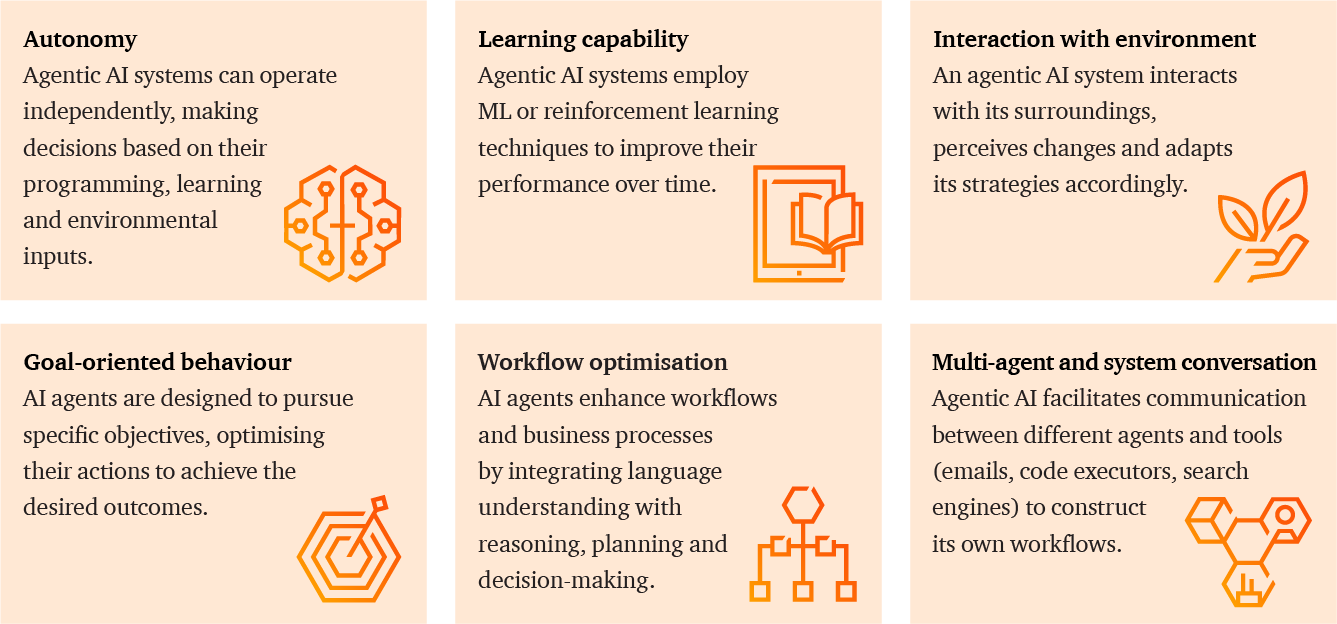
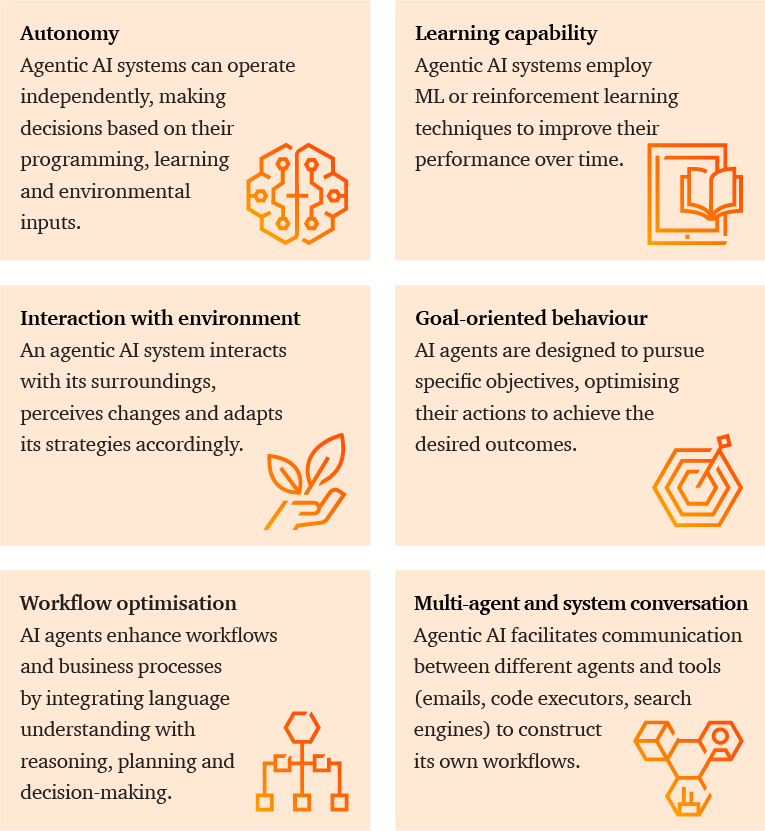
Source: PwC analysis
Task-specific AI agents form the basis of a holistic agentic AI system where multiple AI agents within an agentic AI system collaborate and work as a ‘team’.
Figure 2: Action arc of an agentic AI system in customer service
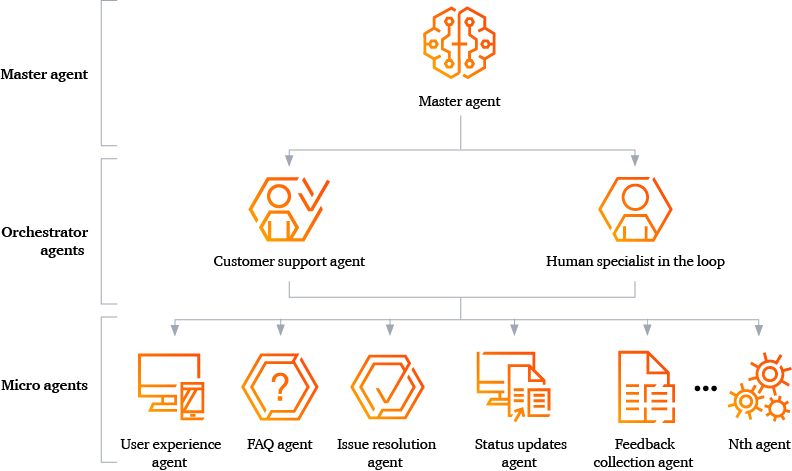
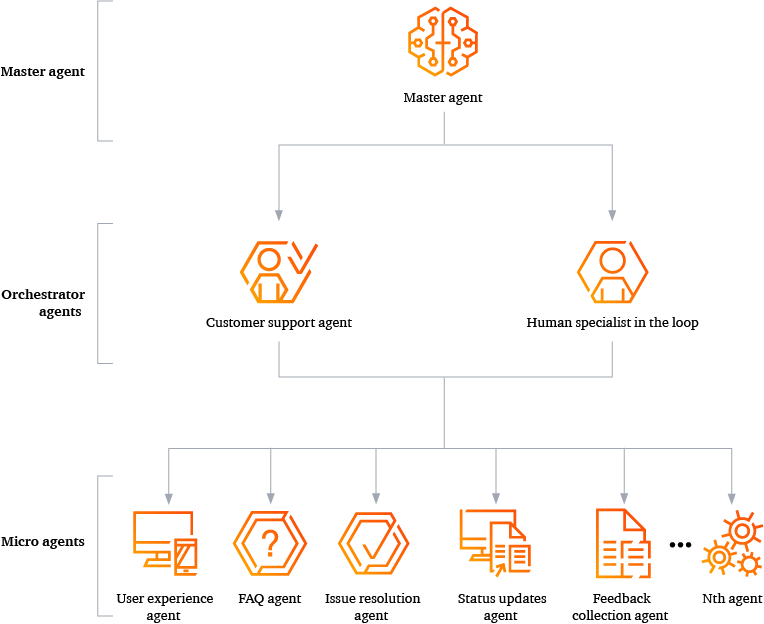
Source: PwC analysis
Agentic AI systems are proactive and take real-time decisions compared to traditional, reactive AI-based automation systems. For instance, an agent ecosystem developed by PwC US to manage a retail giant’s global supply chains not only predicts inventory shortages but also negotiates supplier contracts independently.6
Automation systems such as robotic process automation (RPA), digital process automation (DPA) and copilots work well within rule-based setups, whereas agentic process automation (APA) can adapt dynamically to unpredictable environments and ‘learn’ from outcomes.
APA’s impact is strong within the HR function which is gradually moving from automation to autonomy. While RPA can automate onboarding workflows by verifying documents, creating email accounts, enrolling employees in benefits programmes and carrying out payroll processing and billing, any changes to billing formats would require the system to be manually readjusted.
When applied to the same function, APA eliminates the need for manual interventions. It can autonomously initiate employee onboarding by sourcing suitable candidates from internal portals and external websites, ranking them, collecting and validating documents, and initiating background checks. Human oversight remains optional and can be exercised as needed in such scenarios.
Advanced APA-enabled tools can address employee queries, send reminders and streamline the exit process by processing final clearances and conducting exit interviews. It is important to note that the system can dynamically readjust its goals if any of the processes are altered, ensuring seamless operation.
Agentic AI, therefore, goes beyond being a mere technological evolution – it is a strategic force which is reconfiguring industries, redefining human-AI collaboration, and transforming customer experiences. The technology is based on human needs and aims to understand the nuances of human behaviour like how we move, make, feed, care, build, fuel and power, govern and serve, connect and compute, fund and insure, entailing a paradigm and value shift.
From USD 5.1 billion today, the global market size of agentic AI is projected to grow at an impressive CAGR of 44% to USD 47 billion by 2030.7 In India, the agentic AI market alone is expected to touch USD 1.73 billion by 2030, surging at a staggering 54% CAGR.8
Uniquely positioned as a hub of innovation, cost-effective solutions and digital scale, India stands at the forefront of this intelligent transformation.
Agentic AI in India
India is rapidly emerging as a global powerhouse in autonomous intelligence solutions. The country currently accounts for around 40% of global AI agent deployments, underscoring its pivotal role in shaping the future of intelligent automation.9 It also hosts over 100 active agentic AI companies.10 IT majors in India are creating in-house agentic AI capabilities and crafting vertical-specific agentic AI solutions tailored to clients’ needs. For instance, an IT services provider has partnered with an American technology company to develop AI agents across automotive, financial services, telecommunications and manufacturing industries. The agents’ capabilities include content production, data engineering and workflow optimisation.

Indian enterprises are increasingly focused on enabling AI agents to collaborate seamlessly with human teams and integrate effectively into multi-agent workflows. This reflects a broader shift toward intelligent orchestration where autonomous systems complement human decision-making and operational agility. For instance, a leading IT services and consulting company intends to deploy a large group of AI agents to work alongside humans. For this, the firm aims to invest in AI data centres and cloud infrastructure and work with a human-plus-AI model. Another Indian IT giant has launched several enterprise AI agents which turn complex workflows into multi-agent business operations.
Agentic AI aligns closely with India’s vision of leveraging technology for transformative impact. The country’s strong IT infrastructure, dynamic startup ecosystem and proactive government policies provide a fertile ground for AI innovation. Initiatives such as the National AI Strategy and increased investment in AI research and development underscore India’s commitment to global leadership in this space. India is rapidly positioning itself as a frontrunner in agentic AI, propelled by its vast pool of AI engineers and data scientists. This talent base is driving the development of autonomous systems across diverse industries, with multi-agent workflows emerging as a strategic priority for businesses seeking scalable, intelligent solutions.
Agentic AI in India
India is rapidly emerging as a global powerhouse in autonomous intelligence solutions. The country currently accounts for around 40% of global AI agent deployments, underscoring its pivotal role in shaping the future of intelligent automation.9 It also hosts over 100 active agentic AI companies.10 IT majors in India are creating in-house agentic AI capabilities and crafting vertical-specific agentic AI solutions tailored to clients’ needs. For instance, an IT services provider has partnered with an American technology company to develop AI agents across automotive, financial services, telecommunications and manufacturing industries. The agents’ capabilities include content production, data engineering and workflow optimisation.
Indian enterprises are increasingly focused on enabling AI agents to collaborate seamlessly with human teams and integrate effectively into multi-agent workflows. This reflects a broader shift toward intelligent orchestration where autonomous systems complement human decision-making and operational agility. For instance, a leading IT services and consulting company intends to deploy a large group of AI agents to work alongside humans. For this, the firm aims to invest in AI data centres and cloud infrastructure and work with a human-plus-AI model. Another Indian IT giant has launched several enterprise AI agents which turn complex workflows into multi-agent business operations.
Agentic AI aligns closely with India’s vision of leveraging technology for transformative impact. The country’s strong IT infrastructure, dynamic startup ecosystem and proactive government policies provide a fertile ground for AI innovation. Initiatives such as the National AI Strategy and increased investment in AI research and development underscore India’s commitment to global leadership in this space. India is rapidly positioning itself as a frontrunner in agentic AI, propelled by its vast pool of AI engineers and data scientists. This talent base is driving the development of autonomous systems across diverse industries, with multi-agent workflows emerging as a strategic priority for businesses seeking scalable, intelligent solutions.
Advantage India
India’s rise in the agentic AI landscape is underpinned by the country’s key strengths such as a robust pipeline of AI talent, a vibrant innovation ecosystem and a use case-first approach which prioritises practical impact. The country’s emphasis on responsible AI, its growing data dividend and its status as a global hub for GCCs – many of which are at the forefront of agentic AI adoption – further reinforce its position. These advantages are supported by targeted government incentives and a regulatory environment designed to foster innovation and scale.
India is home to 16% of the world’s AI talent and over nine in 10 knowledge workers in India use AI in the workplace as of 2024.11, 12 Between 2015 and 2024, India has ranked second globally in AI skill penetration with a score of 2.5, second only to the US (2.6).13 Moreover, the demand for agentic AI professionals in the country, driven by IT firms, startups and GCCs is expected to double to around 2,00,000 by 2026.14
The fastest growing job roles in India in the short-term are likely to include big data specialists, AI and ML specialists, and security management specialists. This indicates a growing demand for skills that are central to agentic AI adoption.15 In response, Indian companies are aggressively upskilling employees in AI. Nearly nine in 10 HR leaders in India plan to reskill employees to be competitive in a market shaped by AI agents.16 The government has also ramped up AI skilling at all levels through its flagship IndiaAI mission.17
Employers, therefore, must focus on nurturing India’s dynamic AI talent and positioning agentic AI as a workforce multiplier and complement to human capabilities, not a replacement. With the right incentives and tools, skilled AI professionals in India can seamlessly adapt to evolving job roles and contribute meaningfully to future-ready workplaces.
India’s startup ecosystem, the third largest in the world, is a key driver of the country’s digital innovation landscape. The rising number of AI and GenAI startups are set to catalyse agentic AI’s development and deployment. Between 2020 and 2025, over 140 native AI startups have come up in India18 and in 2024, the number of GenAI startups in the country reached over 240, marking a 3.6x growth since 2023.19
The model of ‘build local, scale global’ is a hallmark of India’s AI advantage. Initially, Indian startups offering agentic AI solutions catered to tech giants; however, now they are experiencing increased demand from small and mid-sized businesses (SMBs) as well as startups.20 Leading Indian startups are creating low-code/no-code platforms to allow clients to build their own AI agents. One such Indian startup, an agentic AI integration platform, helps companies connect external tools to AI agents, thereby streamlining and automating complex workflows.
Some startups have been building plug-and-play AI agents tailored to specific tasks such as product discovery agents which make sense of vague user prompts and payment agents which send reminders and complete transactions. A major AI startup in India recently launched an agentic AI app which is capable of autonomously booking cabs, ordering food, paying bills and even generating in-depth research.
Thus, AI-focused startups in the country are on a steep growth trajectory. Their evolving offerings – both enterprise solutions and AI solutions for consumers – continue to capture investor interest.21 In the coming years, Indian startups are poised to develop advanced, end-to-end agentic solutions while simultaneously transforming their own business models through increased reliance on agentic-powered digital workforces.
India’s emphasis on practical implementation is reflected in its use-case-first approach to AI which prioritises solving real-world problems across sectors such as healthcare, agriculture, education and financial inclusion. This orientation is shaped by the country’s vast and diverse population, which presents both unique challenges and rich opportunities for AI deployment. The impact of this approach is already visible across industries. In healthcare, agentic AI is being applied to disease prediction and personalised treatment. A case in point is a global healthcare company which deployed agentic AI workflows across its oncology practices to automate extraction and standardisation of unstructured documents, improving access to actionable clinical insights by 50%.22
Meanwhile, in agriculture, AI-driven solutions enhance crop yields and optimise resource use. Educational technologies powered by AI are transforming learning experiences, while AI applications in finance are expanding access to services for underserved communities. Thus, India is well-positioned to convert AI experimentation into tangible enterprise value.
India’s focus on responsible AI and governance solidifies its position as a trusted exporter of AI solutions. The country prioritises ethical AI development to ensure that agentic systems are built with transparency and accountability. Collaborative efforts across academia, industry and government are fostering a robust ecosystem for AI research and deployment. The ISO/IEC 42001 certification provides governance and monitoring of AI-based systems within organisations. An international standard, it outlines requirements for setting up, implementing, maintaining, and constantly improving artificial intelligence management systems (AIMS) within organisations. It provides a framework for organisations to ensure that their AI systems are developed and used ethically, transparently and reliably. This standard is applicable to all types of organisations, regardless of their size or the specific AI applications they use.
Thus, Indian enterprises are increasingly prioritising AI governance, trust and adaptability with firms embedding ethical frameworks and compliance mechanisms into their agentic platforms. Several IT majors are enabling enhanced access control measures and making AI agents auditable and policy-compliant while some are securing agent-to-agent communication to ensure safe, accountable and explainable deployment. A multi-layered guardrail deployed by an IT firm tackles bias, personally identifiable information (PII) and hallucination.23
Data plays a key role in decision-making capabilities of this autonomous technology. Lack of data readiness often stalls adoption. Given that the intelligence of AI agents is tied directly to the data they access, fragmented data landscapes could lead to ineffective decision-making.24 A comprehensive, diverse and hygienic data lake is crucial for the functioning of agentic AI. India’s vast linguistic and cultural diversity offers a powerful advantage here – rich, inclusive datasets fuel robust, multilingual AI models. Initiatives such as AI Kosh25 under the government’s IndiaAI mission and AI4Bharat – an open-source platform focused on building LLMs for Indian languages – empower developers to build context-aware, ethical AI rooted in real-world diversity. Bulk of the datasets in AI Kosh aim to support translation tools in Indian languages, such as a multilingual AI voice assistant that provides farmers with weather updates, market prices and government schemes in regional languages.26
Establishing a robust data architecture along with rigorous evaluation processes and governance frameworks is essential for the successful implementation of agentic AI. Extensive measures to safeguard data privacy with techniques such as encryption, relevant access permissions and frequent inspection are also important to ensure transparency. Smooth auditing process and data sources of an agentic system must be documented in detail.27
India’s GCCs are uniquely positioned to foster agentic AI innovations and scale them at a global level. Since 2020, GCCs have seen the rise of hyper automation and AI-powered automation at scale.28 According to a recent survey conducted by PwC India, digital transformation and innovation are the leading services currently offered by GCCs to their headquarters (HQs). Furthermore, HQs are keen for their GCCs to stay focused on this area over the next five years.29 A GCC in the banking sector deployed agentic AI to transform contact centre operations and was able to significantly cut costs and elevate customer experiences. Another GCC in the healthcare space managed to accelerate legacy modernisation processes of payer-side applications by deploying agentic AI, completing tasks that typically take years in a fraction of the time.
Thus, it’s safe to say that global companies across sectors are counting on their GCCs in India to craft innovative solutions for tomorrow. GCCs in India can leverage their access to enterprise data lakes, deep domain expertise and a comprehensive understanding of their HQs’ global processes to develop agentic AI solutions tailored to the parent company’s specific needs.
The government’s initiatives to promote self-reliance by incentivising foundational AI models, boosting the country’s compute capacity and democratising access to AI through the approach of ‘AI for all’30 has set the stage for speedy agentic AI innovation.
The India AI mission, with an outlay of INR 10,300 crore, aims to foster AI innovation and education by boosting compute capacity and creating a scalable cloud-computing platform for researchers and startups to train AI models. As of June 2025, over 17,000 graphics processing units (GPUs) have been installed under public private partnerships (PPPs).31 By offering subsidised access to compute capacity, the government aims to incentivise creation of native LLMs by startups. India is also working on building its own AI chip.32 Under the India AI mission, AI and data labs have been set up in tier 2 and tier 3 cities and AI courses have been increased at the undergraduate, master’s and PhD levels.33
With its sustained focus on fostering an innovation ecosystem for startups, researchers and academics, India is already on the road to develop and deploy cutting-edge agentic AI solutions at scale.
Powering India’s digital ascent for global impact
By 2028, at least 15% of routine work decisions will autonomously be made by agentic AI, up from 0% in 2024. Further, a third of enterprise software applications will include agentic AI by 2028, up from less than 1% in 2024.34 This indicates a fundamental shift in business processes and workflows. Over the next decade, India is poised to play a central role in enabling this global transformation.
While initial adoption of this emerging technology revolved around straightforward applications such as advanced customer support agents, agentic AI deployment has slowly expanded to areas with higher stakes such as healthcare management, research, cybersecurity monitoring and the more complex aspects of banking. Banks are now envisioning AI agents as lifetime engagement partners for customers – from being their first point of contact to laying out their initial financial plans to issuing loans and guiding them through investment journeys.
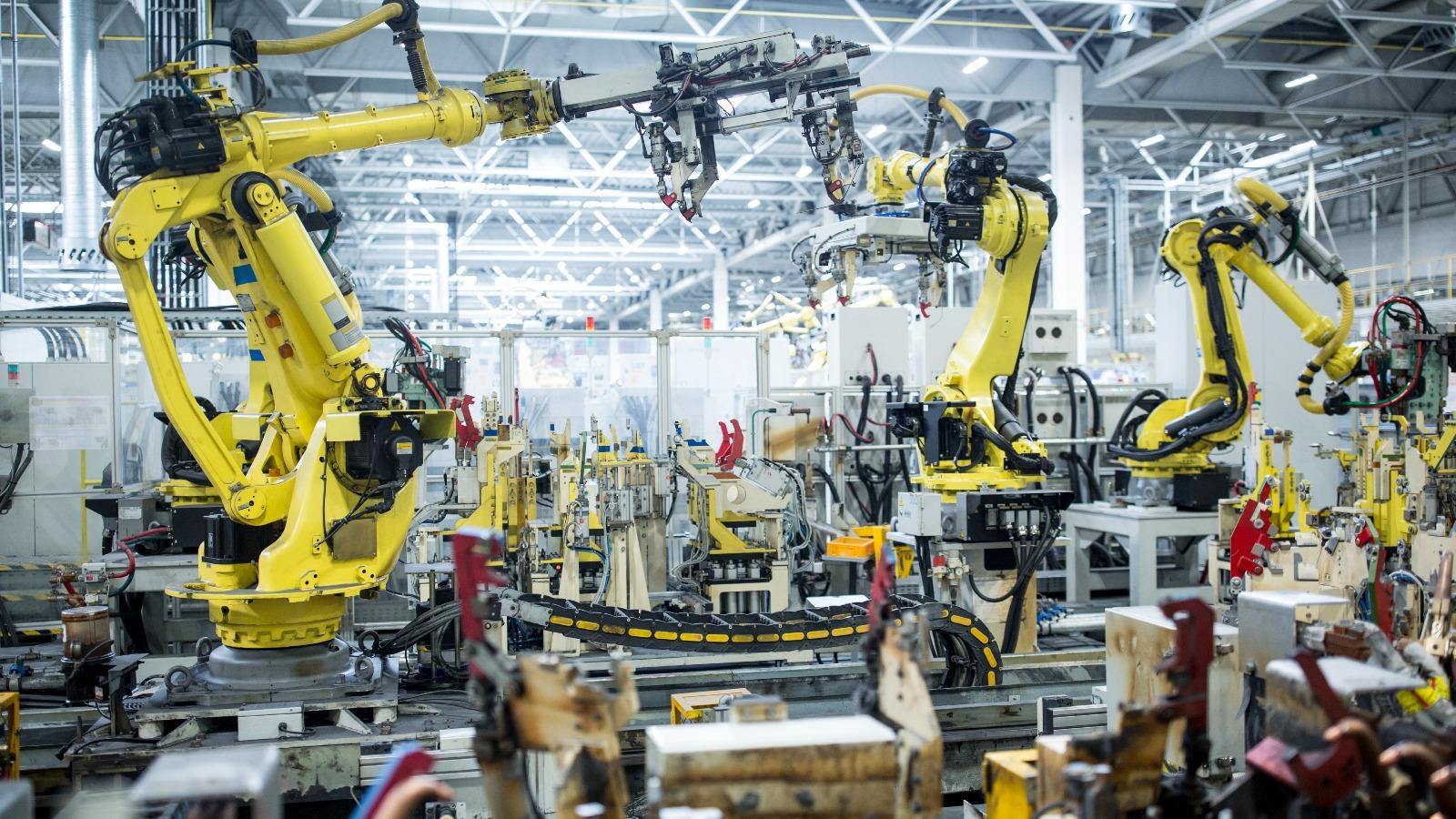
Our analysis reveals that agentic AI’s deployment in a bank can automate KYC updates, reducing the processing time by up to 70%, simultaneously eliminating the need for paper forms, cutting cost and improving customer experience.35 By leveraging predictive analytics, AI agents can optimise staff allocation by anticipating customer footfall and facilitate personalised customer interactions. AI agents can also significantly streamline loan processing by swiftly analysing risk profiles and validating necessary documents through APIs, reducing errors by 90% and reducing approval time by over 80%.36
Agentic AI is also set to catalyse a fundamental shift in India’s manufacturing landscape as it can be leveraged to process repetitive manufacturing functions with precision, boosting output and reducing errors.37
India’s proactive adoption of agentic AI will not only redefine its business and industrial landscapes but also accelerate global technological transformation, cementing the country’s position as a leader in autonomous intelligence.
Immersive Outlook 9
Contact us

















